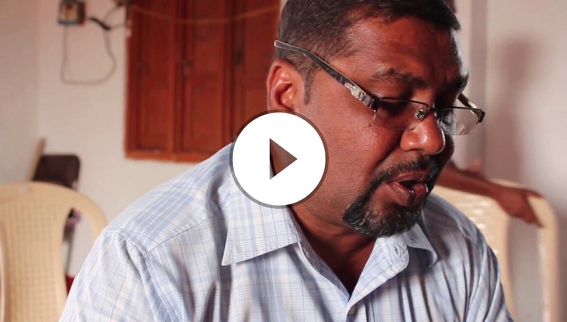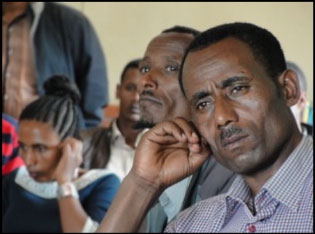It was 1980-something and our church had invited a missionary to speak. Inevitably, this meant the service would go long, so I decided to sit in the balcony. By the time the missionary began his appeal, I was already praying. He raised his arms and said, “God needs people to go into the harvest, people willing to say, ‘Here am I, send me.’” Moved by these words I continued praying, “Not me, not me, O, please God, not me.” The missionary continued, “And God is calling the person out there that is saying, ‘Please God, not me’”. Startled by the missionary’s words and fearing I had spoken out loud, I continued to pray, “Heavenly Father I know you are a God who answers prayers, please don’t send me. I have a brother, send him. I’ll pay.” I spent 30 years trying to forget that day. For the last six months I’ve been working with Freedom to Lead International (FTL), a ministry that provides leadership development among under-resourced ministry leaders in third-world countries. I had been to Africa with FTL just a few months before, but this past February was my first time in Kenya. We were there to visit with an organization that provides discipleship training, socio-economic services,, and help among those persecuted for their Christian faith. This organization’s focus began as a ministry among the unreached people in Kenya, but they have since expanded to nine additional countries in East Africa. We were there to explore a partnership
Read moreReal People With Real Stories “Grace” is 30 years old. Every week she walks on rough roads through mountainous terrain for 25 miles in order to reach the community for Jesus. She is persecuted for her faith, but she persists in her ministry because her calling to the unreached is great. “Ian” worked among an unreached people group. He was one of the very few Christ followers that had made contact with these people. “Jerry” was building into Ian, developing him as a leader in order to grow the church there. Last month, Jerry’s phone alerted him that Ian was calling, except when he answered it wasn’t Ian. The person on the other end had to deliver the bad news that Ian had been killed in a car accident. Jerry lost not just a friend that day, but one of his strategic leaders in his network. With Ian now gone, who is going to carry on this work? These are real people with real stories. These are the people Freedom to Lead International has interacted with on the ground in Kenya this month. They are doing amazing work, but they are under-resourced. A Message For You FTL in East Africa Reaching the Unreached This month we have been meeting a network that spans nine countries in East Africa. They have requested Freedom to Lead International to provide our leadership development program (The Garden Project) for thousands of leaders throughout this large ministry that focuses on unreached people. After 40 of
Read moreCultivating Christ-centered Leaders in a Storycentric Generation Originally Posted on January 26, 2017 by Missio Nexus This is a long overdue book about leadership in a world suffering from future shock – a world changing so rapidly that no one can keep up. Changes are happening so quickly that most of the time it feels like we are living on the starship Enterprise leaping into cyberspace where no man has gone before. Facebook, YouTube, Twitter, Instagram, podcasts and live streaming of sermons, university-accredited online theological degrees, discipleship training, and leadership development provide for a quick, inexpensive means to churn out vast numbers of new leaders for the next generation – the demand is great but the workers are few. Print Version Kindle Version While we now have electronic Bibles flying around the world instantly we may mistakenly think that the digital world will solve most of our most pressing problems of making disciples and leaders in a world where our wrist watches seem to be spinning out of control. Much of the time there is great pressure for Christian leaders to communicate with others at superhuman speed within a context of adapt or die. Now, within this new paradigm of the 21st Century, Rick Sessoms steps into the ring with a novel approach to leadership development. He is advocating going back to basics with an approach Jesus modeled – developing and mentoring leaders face to face using a storycentric approach. After all, Jesus was a brilliant storyteller. He used a
Read moreA Water Pump or Rice Field? We regularly hear about the impact of songs through New Music Monday (NMM) posts. However, what about the impact of the symbols used in Freedom To Lead’s innovative curriculum? In today’s video, Yariwe, a young Bambara pastor (and musician) talks about why he is so excited to see The Garden Project curriculum come to Mali. Yariwe talks specifically about the contrasting images of a rice field and a water pump. For this reason, featured here is the following song, “A Water Pump or Rice Field?” This song is recorded by Yariwe and the rest of the Bambara music team as the background music.
Read moreToday’s song was created in Abidjan, Cote D’Ivoire by a team of Bete musicians. I continue to be amazed at the Bete’s use of vocal harmonies as a dominant feature in their music. (Many cultural groups in West Africa use little or no vocal harmony at all).
Read moreViolence is dividing the Ethiopian people, but a cohort of Christian leaders is resolved to walk Abigail’s path to peace. Many Ethiopian people in East Africa are desperate. Demonstrations are fueled by widespread discontent over the declining quality of life throughout the country. Leaders of the opposition party have recently been arrested, leading to increased unrest. Electricity, water systems, and infrastructure are collapsing, and daily life has become difficult for many. Within the mayhem, a group of Christian leaders want to be agents of reconciliation. They are embracing Abigail’s example to avoid further bloodshed among their countrymen.
Read moreMy grandmother used to help me to remember by saying, “Ricky, tie a string around your finger.” The logic, of course, was that when I saw the string, I would ask myself, “Why is the string there? Oh, I remember.” A string around my finger was kind of hard to forget. Christmas, too, is like a string around my finger. I have a way of forgetting, so each year the celebration of Jesus’ birth is a reminder of at least three things:
Read moreA primary responsibility of leadership is to initiate and manage change. Like many of my peers, I have eagerly embraced this role of change agent during my career. In fact, I like change – that I initiate. On the other hand, I haven’t been so receptive of change when someone else is initiating it. My track record is pretty typical when another leader has initiated change that affects me. Getting in touch with this common reaction is helpful to guide others through the difficult process of change. Most people are uncomfortable with change that someone else initiates, because change – even good change – often brings a sense of loss and grief. How leaders help their people navigate the grief of change often determines leadership success or failure. Leadership and the Five Stages of Grief
Read moreRetired Air Force General Jerry White shared a leadership principle that he practiced over the course of his decorated career: wise leaders seldom express their personal opinions. In light of the post-election unrest in America, our political leaders could have benefited everyone by heeding this advice.
Read moreFounder’s Syndrome If this musing by an organization’s founder on the value of organizational founders seems self-serving, indeed it is. But with the conventional avalanche of driveling complaints I hear and read about “founder’s syndrome,” it’s high time to speak up about the invaluable asset that many organizations forfeit when the founder walks out the door. Examples abound of founders who become a liability to the organizations they labored hard to birth and nurture. They hang on too long. Or they don’t know how to keep their noses out of the successor’s business. Founders whose tenures are long and whose track records are stellar can be particularly annoying when it’s time for a leadership change. Boards, stockholders, and staff are regularly warned of the dangers associated with transitioning founders. We get the message: founders can be a pain!
Read moreThe pending election for the leader of the free world has been hotly debated. The results will determine directions for our nation and planet in years to come. But this time around, millions of us are more deeply skeptical of our choices. Perhaps it’s because “virtuous leadership” needs more attention in our public discourse. The term “virtues” does not carry much credibility because it sounds like a throwback to the Victorian era. In generations past, leaders spoke of virtues, those beliefs and practices that provided common rules of engagement both in public and private life. These virtues included honesty, humility, fairness, justice, and individual dignity. Although our leaders did not always live up to these benchmarks, at least we agreed on what they were.
Read moreLeadership Practices Inventory Assessment One of the requirements for my post-grad program in organizational leadership was to take an inventory to evaluate my own leadership practices. The results were predictable for an ordinary leader; I scored pretty well in some areas and not as well in others. But in one category my scores tanked! What do I do? I’ll try harder, but odds are not so high that I’ll ever excel in this area when leading others. Is there any hope for those who are led by ordinary leaders to experience extraordinary leadership?
Read moreOver the past forty years Americans have increasingly sorted themselves into communities of closely like-minded people: churches, volunteer groups, clubs, lobbies, and political parties. The result is a polarization that has transformed our historic preference for civil discourse into a vast echo chamber of hostile assault. We desperately need leaders who are persuadable, and can help challenge others in their own tribe. As far back as we know, people have belonged to tribes. This is how the human race survived; our tribes protect us, provide stability and predictability within community, and help us interpret reality. It’s why we tend to be a part of tribes today.
Read moreWhat does it take to become an expert? A popular writer cites the “10,000-hour rule.” According to this rule, if you practice for 10,000 hours, you will become an expert. But this rule is an oversimplification of important research: in fields as diverse as music, math, and leadership, deliberate practice is the only kind of practice that promises to produce excellence. 10,000 Hour Rule In his best-selling book Outliers, Malcolm Gladwell cited studies on expert violinists to promote the “10,000-hour rule.” He used Mozart as a prime example. Mozart learned to play at the age of four. Despite his musical genius – both as a performer and a composer – he practiced for thousands of hours to cultivate his art while other boys played with toy soldiers. So Gladwell does get the general concept correctly. To become an expert in any discipline – even for those with latent talent – takes tons of practice. But not all practice is equal.
Read moreThe 2020 Vision Statement of Freedom to Lead: In five years we will see 5000 storycentric leaders in 25 under-resourced countries being transformed into competent Christ-centered leaders. We’ve come to the last of the FTL Summer Blog Series where we have been unpacking FTL’s Vision Statement for the next five years. To recap, FTL is offering under-resourced leaders the opportunity to walk towards freedom, suggesting solutions that go beyond the economic. We have seen how each one of these 5000 targeted leaders has a name and a story. And while we can cultivate, God ultimately does the transforming. Last week we even began exploring the competence issue, though only in part. In conclusion, what is the thread that ties all this together? Competent Christ-centered leadership.
Read moreHere is an example of how the use of songs in The Garden Project cultivates competent Christ-centered leaders.
Read moreThe 2020 Vision Statement of Freedom to Lead: In five years we will see 5000 storycentric leaders in 25 under-resourced countries being transformed into competent Christ-centered leaders. For the FTL Summer Blog Series, we have been unpacking our Vision Statement for the next five years. If you have missed any from this series, feel free to visit each one: Freedom From What? 25 Countries, 5000 Leaders Under Resourced Being Transformed Today we are going to talk about the competent leadership.
Read moreThe 2020 Vision Statement of Freedom to Lead: In five years we will see 5000 storycentric leaders in 25 under-resourced countries being transformed into competent Christ-centered leaders. For the FTL Summer Blog Series, we have been unpacking our Vision Statement for the next five years. First, we took a look at the “Freedom to Lead” part. What do we mean by “freedom”? Next, we examined the numbers, 5000 leaders from 25 countries. Last time we looked at the word “under-resourced.” And today we are talking about “being transformed.” I live on the third floor of an apartment building. I do not have access to a yard or a place to grow a garden, though I do have a small balcony. And because I decided my place needed some fresh life to it, I went out and bought a couple of planters not too long ago. First I started with seeds. After weeks of the wildflower seeds being burrowed with no visible fruit I was getting rather discouraged. Just as I was about to throw it away, this teeny tiny sliver of green gave me hope. Still, patience has never been something I’ve been good at. Perhaps the blooms will come yet. This time though, I decided to pack my planters with dirt, go to the nursery to pick out already blooming plants, and start from there. This time, I am determined to see them stay healthy. So far they have not died on me. Then I went to the craft store.
Read moreToday we are going to look at the word “under-resourced.”
Imagine for a moment – you have sensed a calling to lead others. You sense God wants you to lead in a church, in a business, or in a school. so where do you go to grow in your leadership?
Read moreThe 2020 Vision Statement of Freedom to Lead: In five years we will see 5000 storycentric leaders in 25 under-resourced countries being transformed into competent Christ-centered leaders. For the FTL Summer Blog Series, we are unpacking our Vision Statement for the next five years. These past couple of weeks we have been looking at the “Freedom to Lead” part. We examined where we get this idea of “freedom.” Today we are looking at the numbers.
Read moreFor the FTL Summer Blog Series, we are unpacking our Vision Statement for the next five years. Today, we look at the “Freedom to Lead” part. Where do we get this idea? Why do we choose this as the name of our organization? In John 8:36 Jesus said, So, if the Son sets you free, you will be free indeed.” We believe the freedom he was offering was not just about eternity, but this freedom is a reality in this present lifetime, as lived out in our lives, in our ministries, and in our leadership. This kind of freedom sets leaders free to be all that they can be for Christ.
Read moreSeveral months ago, the team at Freedom to Lead gathered together to think strategically about the future. One of the things that came out of our meetings was a Vision Statement for the next five years. Over the last few weeks, this Vision Statement has been unveiled for partners, friends, and supporters.
Read moreGod is doing a new thing. I (Michelle) live and work in the world that is global church leadership. As a woman I am limited; as an unmarried woman without children, even more so. Lately I have been challenged by how I can maximize the freedom I have in Christ, not just in terms of my salvation, but also in terms of my life and leadership. Better yet, how can I encourage other women in the same way? As we study scripture, we see how women like Esther, Deborah, and Mary influenced others, pointed them to God, and helped them walk in His purposes. These women remind me that I can’t change the world, but I can be an influencer of it.
Read morePragmatism in Practice “It doesn’t matter if it’s right; it only matters if it works.” This motto for leading change dominates 21st century corporations. It’s pragmatism in practice. Pick up any popular book on leading change. The odds are that you’ll find several underlying themes:
Read moreEvangelism and missions both flow from the Great Commission – Christ’s command to “make disciples of every nation” (Matthew 28) by reaching them and teaching them. Isn’t this all just Great Commission work? Yes and no. There is a big difference between those that have been reached with the gospel and those that have not.
Read moreMost leaders I know want to finish well. Yet studies show that the majority of us don’t. Money, sex, pride, power, family problems, and plateauing are cited as the big barriers facing leaders who want to finish well. But what causes leaders to fall prey to these pitfalls? Why do successful, talented, and bright leaders so often sabotage their professional and personal lives through immoral and destructive behavior? Self-Centeredness In most cases, a fall is neither sudden nor without warning. On the contrary, the path of leaders to bad behavior is often a predictable process. The first step toward a downward spiral is growing self-centeredness. Leaders become increasingly confident about their accomplishments until they start to believe that they are special. As a result, they begin to make decisions in isolation, discounting the contributions and counsel of others.
Read moreRecently I was reading the New Testament book of Acts. I wondered, Why would Luke the author devote such a long chapter of his book (27) to describe a voyage and shipwreck? Surely he could have spared us all the detail! But skilled as a writer and inspired by God, Luke presented important facts about Paul the courageous leader in a time of great crisis. Paul was prisoner aboard a ship bound for Rome. The ship had already encountered adverse winds, and November storms were looming. Speaking from experience – he had already been through three other shipwrecks – Paul warned the crew of impending danger. But as men in charge often do, they ignored him.
Read moreMovements and Institutions. It’s trendy to criticize institutions. Decaying behemoths that cater to the elites of a bygone cause are easy targets. Across the political and religious landscape, many prefer to associate with “movements” that eschew the traditional establishment in favor of an idealized future. Yet a nagging reality remains: any movement that does not institutionalize will not have lasting impact. In politics, movement is in; institution is out. New Jersey Governor Chris Christie has referred to Trump’s popularity in the current Republican race for the White House as a “movement.” Bernie Sanders’ “movement” has also resulted in his unlikely surge among disaffected voters. Institutions get backhanded in the religious world as well. For example, I just read another Christian leadership author who repeats the predictable mantra that movements are preferable over institutions. Although the vast majority of his book’s endorsements are from institutional leaders, the author pontificates that movements prioritize innovation and spontaneity while institutions focus on control that “quenches the Spirit.” We get the message: movements are good; institutions are bad.
Read moreLiteracy is an extraordinary gift to people and societies. In 1439, Johann Gutenberg was tinkering around with an old winepress and adapted it to become the first movable-type printing press. His invention lit the fuse on a reading revolution. The wide distribution of ideas became possible for the first time in human history, and the mass production of books made it harder to suppress the flow of thought among common people. Printing led to a higher degree of accuracy and standardization of texts. The decrease in the cost of books made it possible for people to learn outside the traditional educational system. In short, reading and writing came within the reach of the masses, thus fueling unprecedented intellectual development, distributing political influence beyond the privileged elite, an improving overall economic security. Literacy is an extraordinary gift to people and societies.
Read morePrudence has been an essential leadership virtue historically, but the word has largely fallen out of use. Prudence was considered one of the greatest of virtues two thousand years ago. A hundred years ago it was part of moral philosophy, and today it is the punchline of a joke. For people of a certain generation it will forever conjure up the memory of Dana Carvey impersonating George H. W. Bush saying, “Wouldn’t be wise; wouldn’t be prudent.”
Read moreA few weeks ago I was sitting on a plane watching the recent movie release, Maze Runner – The Scorch Trials. One of my sons recommended it. The opening scenes of Maze Runner occur in a devastated and desolate urban landscape with towering skyscrapers toppled into each other; the wealth and highest architectural achievements of a previous generation crumbling to dust. Additionally, many human inhabitants have mutated into something else – something diseased and contagious with a voracious appetite to devour those who are normal and healthy. I was surprised and at first annoyed that this was yet another story of twenty-somethings dealing with a post-apocalyptic landscape; a landscape that included zombie-like creatures (which are never called zombies in this film by-the-way). I groaned at this addition to a long list of similar films and video games.
Read moreTell us the Story I have this recurring memory of sitting on my grandfather’s lap as he would tell us the story of Brer Rabbit and the Briar Patch. He didn’t need to read the story from a book, but made the tale come alive with his animations, character voices, and lively descriptions. “Tell it again, Grandpa!” my brother and I would exclaim over and over again. Grandpa also had this signature clicking sound he did with the back of his throat that sounded like the clopping of a horse. It was a sound that no person in the following generations has ever been able to recreate. Grandpa has since passed on from this world, but his stories remain.
Read moreDesperate Desire Everybody’s got a hungry heart. – Bruce Springsteen What is the longing within leaders to reach audacious goals, to “make a dent in the universe,” to leave a legacy? We are designed with this longing, and only freedom will lead us to our destiny.
Read moreNineteen years ago “Marcell” was living in Thailand when he started an international ministry to rescue young girls and boys caught in human trafficking. For nearly two decades he has travelled the globe with tireless passion. He has built a respected ministry with a combination of hard work and charisma. As the ministry has grown, his staff has come to expect his presence and personal involvement in nearly every new initiative. But Marcell is getting older, and is visibly worn with the grind. He worries about the future of the ministry. But when asked about his plans for leadership succession, he comments, “That’s God’s job, not mine. Just as God anointed me, so He will raise up another to take my place.”
Read moreWestern culture celebrates the production of knowledge, and literacy exponentially multiplies the possibilities for the refinement and application of this knowledge, thus enabling new discoveries. But has this literacy-bound process caused us to be blind to systems of knowledge that are not written down? Do we ignore brilliance in those around us because their expertise is not reproduced in literate forms? Or worse, do we treat those around us with disdain when the artistry of their work should produce admiration and respect?
Read moreSmartphones inhabit an essential place in our daily lives. We call them “smart” because they allow us to do everything except talk to each other. That’s a problem.
Read more“Then he said to his disciples, ‘The harvest is plentiful, but the laborers are few; therefore pray earnestly to the Lord of the harvest to send out laborers into his harvest.’” Matthew 9:37-38 In this passage of Scripture, Jesus gives us three ways to reach the lost: praying, sending, and going. The one command is “pray earnestly.” It’s one word in the original; it has the connotation of pleading for something. We all have the responsibility to plead for the lost, praying specifically that the Lord would send out workers to reap a harvest of lost souls. They are there ready to be “reaped.” This type of pleading prayer is set in the context of Jesus going from village to village seeing the people that were like “sheep without a shepherd” (v. 36). Christ had compassion for the lost and he was asking for his disciples to have that same kind of compassion. In essence, Jesus is calling the disciples into a Gospel partnership as they plead with the Lord for harvest workers.
Read moreCourageous Leadership Steven Spielberg’s film “Lincoln” highlighted a four-month period at the end of the Civil War in 1865 that is instructive for leaders facing a new year’s opportunities and challenges. The United States’ sixteenth president had declared that he hated the “zeal” for slavery’s expansion. “I hate it because of the monstrous injustice of slavery itself,” Lincoln said, and “I hate it because it . . . enables the enemies of free institutions, with plausibility, to taunt us as hypocrites—causes the real friends of freedom to doubt our sincerity.”1 Lincoln correctly calculated the task before him, and described the Emancipation Proclamation as “the central act of his administration.” His courageous leadership to end slavery was a pivotal event in American history.
Read moreLeaders craft the cultures of their organizations – consciously or not – by what they consistently measure. If leaders want something to become important – or remain important – in the minds and hearts of organizational stakeholders, they must figure out a way to measure it. On the other hand, if leaders do not highlight a particular value or provide a means to measure it, that stated value will not likely be an actual value in the organization – especially in times of stress and pressure.
Read more


























